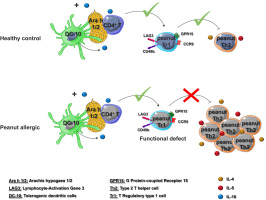Journal of Allergy and Clinical Immunology ( IF 11.4 ) Pub Date : 2017-07-06 , DOI: 10.1016/j.jaci.2017.05.045 Laurence Pellerin 1 , Jennifer Anne Jenks 2 , Sharon Chinthrajah 2 , Tina Dominguez 2 , Whitney Block 2 , Xiaoying Zhou 2 , Arram Noshirvan 2 , Silvia Gregori 3 , Maria Grazia Roncarolo 4 , Kari Christine Nadeau 2 , Rosa Bacchetta 4

|
Background
Peanut allergy (PA) is a life-threatening condition that lacks regulator-approved treatment. Regulatory T type 1 (TR1) cells are potent suppressors of immune responses and can be induced in vivo upon repeated antigen exposure or in vitro by using tolerogenic dendritic cells. Whether oral immunotherapy (OIT) leads to antigen-specific TR1 cell induction has not been established.
Objectives
We sought to determine whether peanut-specific TR1 cells can be generated in vitro from peripheral blood of patients with PA at baseline or during OIT and whether they are functional compared with peanut-specific TR1 cells induced from healthy control (HC) subjects.
Methods
Tolerogenic dendritic cells were differentiated in the presence of IL-10 from PBMCs of patients with PA and HC subjects pulsed with the main peanut allergens of Arachis hypogaea, Ara h 1 and 2, and used as antigen-presenting cells for autologous CD4+ T cells (CD4+ T cells coincubated with tolerogenic dendritic cells pulsed with the main peanut allergens [pea-T10 cells]). Pea-T10 cells were characterized by the presence of CD49b+ lymphocyte-activation gene 3 (LAG3)+ TR1 cells, antigen-specific proliferative responses, and cytokine production.
Results
CD49b+LAG3+ TR1 cells were induced in pea-T10 cells at comparable percentages from HC subjects and patients with PA. Despite their antigen specificity, pea-T10 cells of patients with PA with or without OIT, as compared with those of HC subjects, were not anergic and had high TH2 cytokine production upon peanut-specific restimulation.
Conclusions
Peanut-specific TR1 cells can be induced from HC subjects and patients with PA, but those from patients with PA are functionally defective independent of OIT. The unfavorable TR1/TH2 ratio is discussed as a possible cause of PA TR1 cell impairment.
中文翻译:

从过敏受试者体外诱导的花生特异性 1 型调节性 T 细胞功能受损
背景
花生过敏 (PA) 是一种危及生命的疾病,缺乏监管机构批准的治疗方法。调节性 T 1 型 (T R 1) 细胞是免疫反应的有效抑制因子,可以在反复接触抗原后在体内或通过使用致耐受性树突状细胞在体外诱导。口服免疫疗法 (OIT) 是否导致抗原特异性 T R 1 细胞诱导尚未确定。
目标
我们试图确定是否可以在基线或 OIT 期间从 PA 患者的外周血体外生成花生特异性 T R 1 细胞,以及与健康对照 (HC) 诱导的花生特异性 T R 1 细胞相比它们是否具有功能科目。
方法
耐受性树突状细胞在 IL-10 的存在下从 PA 和 HC 患者的 PBMC 中分化出来,用花生的主要过敏原Arachis hypogaea、Ara h 1 和 2 脉冲,并用作自体 CD4 + T 细胞的抗原呈递细胞(CD4 + T 细胞与用主要花生过敏原 [豌豆-T10 细胞] 脉冲的耐受性树突状细胞共同培养)。豌豆-T10 细胞的特点是存在 CD49b +淋巴细胞激活基因 3 (LAG3) + T R 1 细胞、抗原特异性增殖反应和细胞因子产生。
结果
CD49b + LAG3 + T R 1 细胞在豌豆-T10 细胞中被诱导,HC 受试者和 PA 患者的百分比相当。尽管具有抗原特异性,但伴有或不伴有 OIT 的 PA 患者的豌豆 T10 细胞与 HC 受试者相比,在花生特异性再刺激后没有无反应性并且具有高 T H 2 细胞因子产生。
结论
花生特异性 T R 1 细胞可以从 HC 受试者和 PA 患者中诱导出来,但那些来自 PA 患者的细胞在功能上存在缺陷,与 OIT 无关。不利的 T R 1/T H 2 比率被讨论为 PA T R 1 细胞损伤的可能原因。











































 京公网安备 11010802027423号
京公网安备 11010802027423号